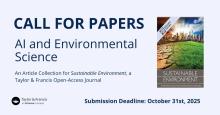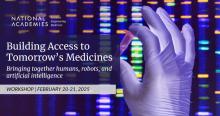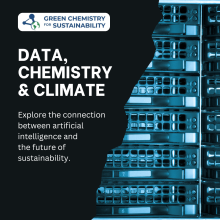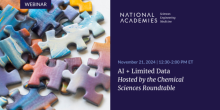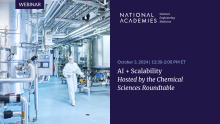artificial intelligence
Building Access to Tomorrow’s Medicines: bringing together humans, robots, and artificial intelligence - A Workshop
The National Academies of Sciences, Engineering, and Medicine will host a workshop exploring the transformative potential of artificial intelligence (AI) and machine learning (ML) in chemical sciences and drug discovery. Sponsored by the Chemical Sciences Roundtable, this event will bring together researchers, policymakers, and stakeholders to examine how AI tools can address data biases and democratize pharmaceutical research, potentially reducing drug development costs down from billions of dollars and decades of work.
Development of Machine Learning Models on the Ani-icing Performance of NADES for Application in Anti-icing Coatings
Ice formation remains a critical challenge across multiple industries, posing safety risks, economic burdens, and, in extreme cases, fatalities. Effective anti-icing strategies are essential to mitigate these issues, yet the demand for environmentally friendly, cost-effective, and efficient solutions persists. Natural deep eutectic solvents (NADES) have emerged as a promising low-toxicity alternative for addressing ice formation.
DP4+ APP: Simplifying In Silico Structural Elucidation. Scope and Advantages of Each Correlation Method
A novel statistical correlation method, MM-DP4+, was developed to enhance NMR-based molecular structure elucidation by significantly reducing computational costs through the use of MM-optimized geometries. A comprehensive evaluation of 36 theory levels identified SMD/ωB97XD/6-31+G**//MMFF as the most accurate and cost-effective approach, achieving 91% accuracy in stereochemical assignments. A Python-based software, DP4+App, was created to streamline the implementation of DP4+, MM-DP4+, and customizable DP4+ calculations via a user-friendly interface.
AI + Limited Data (part of the National Academies AI + Y Series)
AI's potential in meeting sustainability challenges include improving resource management; mitigating wastes generated through industrial processes; and minimizing disruptions while still preserving excellent safety standards. AI tools have already been shown to improve processes for chemical engineering but AI as a part of a digital revolution in the chemical industries is still unfolding.
AI + Scalability| Hosted by the Chemical Sciences Roundtable
Join us October 3, 2024 from 12:30-2:00 PM ET for the second installment of the Chemical Sciences Roundtable’s 2024 webinar series on AI topics in the fields of chemistry and chemical engineering where Melanie Mesropian (AIChE) will moderate an interactive conversation between Leo Chiang (Dow Chemical) and Greg Mulholland (Citrine) about what it means to use AI tools sustainably with possible examples ranging from R&D efforts to product manufacturing.
AI Platform for Chemical Formulation
InFLOWS AI offers a suite of computer-aided tools designed to revolutionize chemical formulation. Developed by experts in chemistry, AI, and high-performance computing, the platform includes tools such as FitFLOW, which evaluates ingredient-product affinity, safety, and function; SwapFLOW, which identifies greener, safer, and better-performing alternative compounds; DesignFLOW, which leverages AI-driven recipe design to optimize formulas for performance, cost, and efficacy; and MetaFLOWS, which conducts meta-dimensional analyses for comprehensive business transformation.
Computational chemistry and Digitalization Platform
DUDE CHEM is a German-based startup dedicated to advancing sustainable chemical production. The company aims to revolutionize the chemical-pharmaceutical industry by developing greener active pharmaceutical ingredients (API) and intermediates.
Sea Technology™ -- Seaweed-Derived Alternatives to Plastic
Loliware has developed Sea Technology™, a groundbreaking category of seaweed-based resins designed to replace plastic at scale. Utilizing regenerative, carbon-capturing, ocean-farmed seaweed, Sea Tech™ Resins mimic the look and feel of traditional plastics and are specifically engineered to be compatible with existing manufacturing equipment, ensuring a smooth transition to sustainable practices. These resins are always Designed to Disappear™, decomposing as quickly as a banana peel. Products made from Sea Tech™ can either be eaten or composted into soil.
Pagination
- Page 1
- Next page
